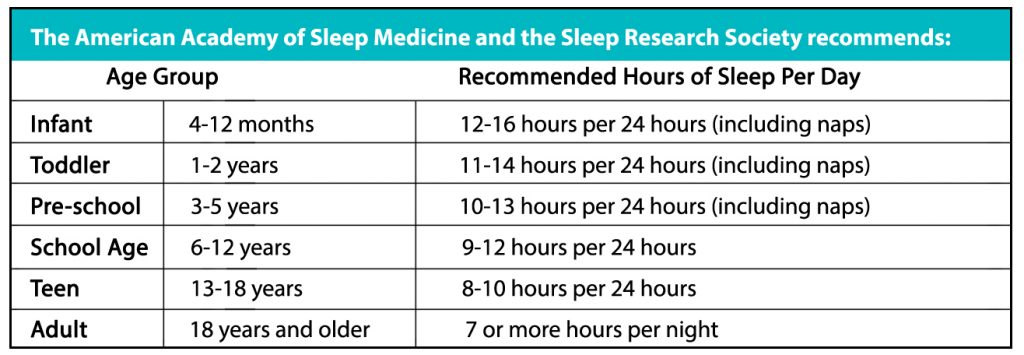By Sadiq Al-Nakeeb, M.D., F.C.C.P.
Board Certified – Pulmonary, Critical Care and Sleep Medicine
Did you sleep at least 7 hours last night? Do you normally sleep 7 or more hours each night?
 Most of us may occasionally reduce the hours we sleep for a variety of reasons. Whether it is work-related, family demands, a special occasion, or even to watch a good show on television, we may forego sleep for something else from time to time. But if you are frequently not getting enough sleep, you are putting your health in jeopardy. You may be at an increased risk for obesity, diabetes, high blood pressure, coronary heart disease and stroke, poor mental health, and even early death. As little as one night of short sleep can affect you the next day. Not surprisingly, you’re more likely to feel tired. Additionally, you’re more likely to be in a bad mood, be less productive at work, and to be involved in a motor vehicle crash.
Most of us may occasionally reduce the hours we sleep for a variety of reasons. Whether it is work-related, family demands, a special occasion, or even to watch a good show on television, we may forego sleep for something else from time to time. But if you are frequently not getting enough sleep, you are putting your health in jeopardy. You may be at an increased risk for obesity, diabetes, high blood pressure, coronary heart disease and stroke, poor mental health, and even early death. As little as one night of short sleep can affect you the next day. Not surprisingly, you’re more likely to feel tired. Additionally, you’re more likely to be in a bad mood, be less productive at work, and to be involved in a motor vehicle crash.
Over 25% of the U.S. population reports occasionally not getting enough sleep, while nearly 10% experience chronic insomnia. Fortunately, new methods for assessing and treating sleep disorders bring hope to the millions suffering from insufficient sleep. Getting sufficient sleep is not a luxury—it is a necessity—and should be thought of as a “vital sign” of good health.
What causes sleep problems? There are many answers – it is definitely not a “one-size fits all” question. As we get older, our sleep-wake cycle may not work as well as it did when we were younger. Lifestyle habits, such as smoking, drinking alcohol or caffeinated drinks, can cause sleep problems. Sometimes, illness or pain (due to an injury, or chronic condition), and even medications can prevent a good night’s sleep.
Physicians Regional – Collier Blvd. has recently expanded its Sleep Center to 4 beds. Sleep Center Medical Director, Dr. Sadiq Al-Nakeeb, Board-
Certified Pulmonary, Critical Care and Sleep Medicine Physician, tells us the decision to expand was to meet increasing demand for sleep studies. “The number of patients I see each week who are getting insufficient sleep, for a variety of reasons, continues to increase.”
The most common condition that prevents people from getting a good night’s sleep is sleep apnea. Dr. Al-Nakeeb explains, “Sleep apnea is a disorder in which a person stops breathing repeatedly while asleep. Those with sleep apnea typically snore very loudly. They stop breathing for 10-30 seconds during sleep, and then start breathing again with a gasp. It is not uncommon for this to happen dozens to hundreds of times in a single night. When this happens, the person wakes up briefly, interrupting sleeping patterns. This can also cause high blood pressure and increase the risk of cardiovascular disease.”
Sleep studies help doctors diagnose sleep disorders such as sleep apnea, periodic limb movement disorder, narcolepsy, and REM sleep behavior disorder.
Since people aren’t typically aware of their breathing, movements, and other habits while they snooze, a sleep study will help a doctor examine them while you’re in dreamland. Electrodes on wires are attached with paste to your head and body—the process is completely painless—to monitor your brain waves, rapid eye movements, oxygen levels, breathing patterns, respiratory efforts, snoring, muscle tone and leg movements, heart rate, and more.
The sleep study is done overnight, and is typically performed in a sleep lab; however a home study test may be ordered. Following the study, a trained professional will analyze all information, and then a sleep specialist will review your results, and discuss treatment options, if necessary.
Dr. Al-Nakeeb offers the following recommendations to help you sleep better:
• Keep a set sleep schedule – go to bed and get up at the same time every day, including weekends.
• Do not take naps longer than 20 – 30 minutes
• Avoid big meals at night
• Avoid caffeine about 8 hours before bedtime.
• Avoid nicotine and alcohol in the evening.
• Avoid using bright screens within 1-2 hours before bedtime. This includes computers, tablets, cell phones, and TV. The blue light emitted by these devices is especially disruptive.
• Time your exercise right – finish moderate to vigorous workouts at least three hours before bedtime.
For more information, or to schedule an appointment with Dr. Al-Nakeeb, please call Physicians Regional Medical Group at 239-348-4221, or request an appointment online at www.physiciansregionalmedicalgroup.com.









